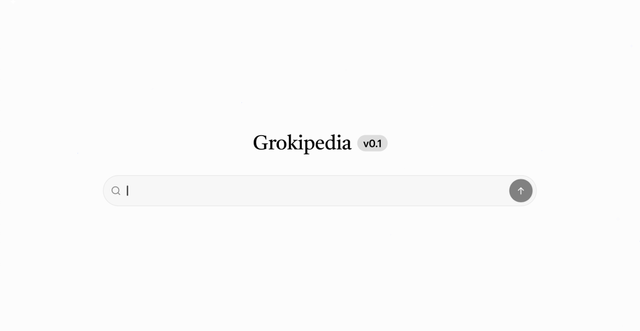Elon Musk’s Grokipedia: A Case of “Copy-Paste” Controversy?
Remember when Elon Musk unveiled Grok, the “maximum truth-seeking AI?” Well, its companion project, Grokipedia, meant to be a more straightforward, less snarky alternative to Wikipedia, is already making headlines – and not for the right reasons. Reports have surfaced alleging that Grokipedia relies heavily on copied content from Wikipedia, raising questions about originality, copyright, and the very ethos of a “truth-seeking” platform. Is Grokipedia an innovative information resource or simply a clone of the internet’s favorite encyclopedia?
Grokipedia’s Content: Striking Similarities to Wikipedia
The accusations of plagiarism stem from users noting significant textual overlap between Grokipedia entries and their corresponding Wikipedia counterparts. In some cases, entire paragraphs appear to be verbatim copies. This isn’t just a matter of using Wikipedia as a source (which is perfectly acceptable with proper attribution); it’s about presenting Wikipedia’s words as Grokipedia’s own. This raises serious concerns about intellectual property and whether Grokipedia’s development team properly credited the original authors and editors of Wikipedia.
Examples of Content Overlap
Several examples have been circulating online, showcasing these striking similarities. For instance, comparisons of articles on historical figures, scientific concepts, and even pop culture topics reveal duplicated phrases and sentences. The Reddit thread documenting these instances is rapidly growing, with users contributing more examples of potential copyright infringement. The level of direct copying suggests a systematic reliance on Wikipedia’s existing content base, rather than original research or synthesis.
The Implications of Copying
Copying content without attribution is a serious ethical and legal issue. Wikipedia operates under a Creative Commons license, which allows for the reuse of content, but only if proper credit is given. By not acknowledging Wikipedia as the source, Grokipedia appears to be violating the terms of the license. This could expose the platform to legal challenges and damage its credibility.
The Ethical Dilemma: “Truth-Seeking” vs. Originality
The controversy surrounding Grokipedia raises fundamental questions about the role of AI and the ethics of content creation. If a platform claims to be dedicated to “truth-seeking,” should it not also uphold principles of originality and transparency? Copying content, even from a freely available source, undermines the very foundation of trust that Grokipedia aims to build.
Musk’s Vision vs. Reality
Elon Musk has often spoken about the importance of combating misinformation and promoting accurate information online. However, the alleged reliance on copied Wikipedia content casts a shadow on this vision. If Grokipedia’s content is simply a regurgitation of Wikipedia, what value does it add to the information ecosystem? Does it offer a unique perspective, or does it merely repackage existing information under a new brand?
The Role of AI in Content Creation
This situation also highlights the challenges of using AI to generate content. While AI can be a powerful tool for summarizing information and identifying patterns, it cannot replace human creativity and critical thinking. Grokipedia’s reliance on copied content suggests that its AI may not be sophisticated enough to produce truly original and insightful content. The incident acts as a cautionary tale about the potential pitfalls of blindly trusting AI-generated information without thorough human oversight and verification.
Potential Solutions and Future Implications
Addressing the issues surrounding Grokipedia will require a multi-faceted approach. At a minimum, it will require acknowledging the source of the content and giving proper attribution to Wikipedia. Beyond that, the incident raises larger questions about the future of content creation and the responsibilities of those developing and deploying AI-powered information platforms.
Corrective Measures and Transparency
One immediate step Grokipedia could take is to publicly acknowledge its reliance on Wikipedia content and provide clear attribution on each page. This would demonstrate a commitment to transparency and ethical content practices. The team could also implement a system for identifying and flagging potentially copied content, ensuring that future contributions are original or properly attributed.
Rethinking the Approach to Content Creation
Perhaps the biggest lesson to be learned from this controversy is the need to rethink the approach to content creation for platforms like Grokipedia. Rather than simply copying existing content, the focus should be on generating original insights and perspectives. This could involve leveraging AI to analyze data, identify trends, and generate summaries, but it should always be done with human oversight and a commitment to originality and accuracy. Only through this kind of responsible development will AI-powered information platforms be able to fulfill their promise of providing valuable and trustworthy information to the public.
Conclusion: Grokipedia’s Credibility on the Line
The allegations of copied Wikipedia content present a significant challenge to Grokipedia’s credibility. While the platform may have noble intentions, its reliance on existing content without proper attribution raises serious ethical and legal questions. Whether Grokipedia can overcome this controversy and establish itself as a trustworthy source of information remains to be seen. This situation emphasizes the need for transparency, originality, and responsible AI development in the increasingly complex world of online information. The future of Grokipedia hangs in the balance, depending on how it addresses these critical issues.
